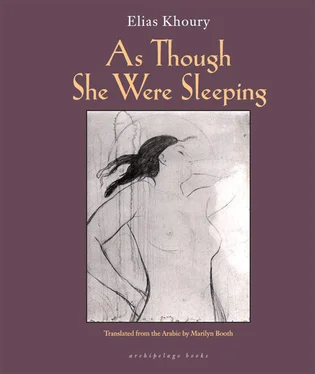God save you, stop pounding those nails, brother!
She sees herself getting out of bed and walking barefoot into the dar . The gloom is barely touched by a pale nighttime glow that creeps into the house through the window. Little Milia walks across splinters of glass, and her blood makes butterfly shapes on the tiles.
But the mirror was there, hanging on the wall. She almost whispered thank God because the dream had not been able to break the mirror. But her heart fell sickeningly and she felt faint. She saw her portrait there, suspended inside of a swaying beam of light coming out of the mirror. The photograph Musa had hung on the wall of the liwan in the large house — precisely over the bed in which she had been born — was here. The white background blurred into the black. Only the open eyes escaped the black patches spreading across nose and lips and chin and brow. She did not see the long hair extending down this silhouette’s back like a river dyed in black and brown tints that curl round each other.
Where’s her hair? she asked, her voice low.
She looked around to find Musa sitting on the sofa beneath which the little girl had hidden herself. He had on his father’s tarbush and he held a black rosary.
Where did those beads come from, Papa?
That’s what she called him but she didn’t anticipate a response, for she knew well that this person sitting on the sofa gazing steadily at the picture in the mirror was not her father. It was her little brother, whose fear of the dark she had once dispelled with a touch of her fingers.
What brought you to Nazareth? she asked.
I’ve come to take the boy.
No, this is my son! No, you can’t do what your father did to you when you followed him to the Egyptian woman’s place and he threw a rock at you, trying to kill you.
Why, when she thinks of them, do people get confused with each other? This is not her father, she knows, because this man’s olive coloring is nothing like the pallor of Yusuf’s skin. But why did he come to take the boy who has not yet been born? Why does he pound nails into the mirror? She hears the pounding of that day at the cross. The Lebanese monk had told her that the greatest suffering the Messiah endured in his final moments was that of hearing the sounds of his own crucifixion. As they pounded the nails into his hands and feet the sounds grew louder and louder, unbearably loud, and his whole body seemed a pair of enormous ears transmitting the tiniest sound. Everything rang and pounded. Can you imagine what heartbeats sound like when they escape the rib cage? The crucifixion, my daughter, is the sound of this violent pounding which turns the body into nothing more than an echo. Stand above the wadi and shout and then listen. Imagine that your body is the valley and there are hundreds of pounding nails screaming into it.
Musa had become a little boy again. Milia had to stoop to wipe away his tears with her fingers; to raise him from childhood to manhood. But when she bent over and put her hand out to his eyes, he pushed her away roughly and stood stiffly silent before the photograph.
She looked where he was looking. She saw an image of Mansour reflected next to the image of Milia that was now fixed onto the mirror. Instead of calling her husband by his name she screamed. Why did you kill her, Musa?
On the day when she got up and walked out of the Italian Hospital, leaving her husband there with the Italian doctor and following whatever path her feet led her down, Milia searched through the streets and alleys for the Lebanese monk but she found no traces of him. She sat down on the stone edging at the Virgin’s Wellspring, closed her eyes, and saw.
Do not ask her — none of you, no one ask her — what she saw for she will not be able to tell you. This was the miracle she had awaited ever since the puzzling dream that had seemed more like a vision and that led her to her future fate in Nazareth. Did Tanyous not tell her that the Carpenter had lost his speech when he went in to his virgin wife and found her pregnant? He tried to ask her and his tongue turned to wood in his mouth. Rather than expressing anger or pain he went into a comalike state and that brought the angel. There he heard the beginning of the story which he would only fully understand beneath the olive tree, when the boy told it to him, years later.
Tanyous said that they used to call Yusuf the Carpenter the mute saint. True, he did utter words when his son told him the story but then he lived out the days of his life permitted to him on this earth in a more or less silent state, uttering the fewest possible words, as though he understood that whatever he had to say would be said only at the very end, when he would go in search of the boy before he was snatched away and taken above.
Was it true that Milia saw the sainted nun?
She sits, tired and faint, bent over her pain. She tries to speak but she cannot. The Italian doctor does not know what to do with this woman. And then he turns to the nurse and says something in Italian which the patient does not understand and she embarks on the voyage inside the secret world of childbirth.
Human voices faded and the nun appeared. She spoke in Tanyous’s voice and told this woman she must prevent Mansour from taking his son to Jaffa. Milia wanted to say, I beg of you, Haajja Milana, and she heard her mother’s voice edged with fear. What choice did the woman sitting on the brink of the Virgin’s Wellspring have other than to pursue her entreaties. I beseech you, Haajja Milana, I don’t want to become like my mother, she said in the same voice that she seemed to hear.
I beseech you, my sister, why is your voice like his? Where is our Father Tanyous? He said he wanted to tell me the secret and then he disappeared, and now you have come to me instead. I am afraid of you, ever since I was little I have been afraid of you, and I don’t want to live this whole story. I am not my mother. Mama was halfway to being a nun and that is not what I am. My fears are for the boy and all I want from God is to be left alone. I am going to Jaffa, fine, and I am so tired, but tell Tanyous that I want to see his face before I have the baby. I just want his blessing, that’s all, and then, khallaas , fine, whatever he wants can happen. Where is Tanyous?
I am Tanyous.
Milia heard Tanyous’s voice coming from the nun’s body. Had this all been a delusion of some sort? Then why would Mansour have told her he had gone to the monastery; why would he make up an entire story, start to finish, about the Lebanese monk? Who, then, had told her about Yusuf the Carpenter? Had it been nothing more than a very long dream?
She got up heavily and walked home. She kept her head bent so that she would see no one and be visible to no one, and when she reached the dar she saw her image suspended upon the mirror. She wanted to ask Mansour why he had brought the photograph here and from where he had gotten it. She discovered, though, that she had lost her voice. She laid her head on the pillow and fell into a deep sleep.
Musa came because she wanted him to come.
She was alone in the house. December darkness spread over the room, settling onto the coldness of the house. She put on her blue nightgown and slipped between the whiteness of the sheets and closed her eyes. And she told Musa to come.
She needed him, she said, and she wanted to tell him the story. She did not dare tell him she had heard the story from the Lebanese monk. She was not certain of anything now, anyway. The monk had disappeared into Milana’s long black robe. She did not like the nun. She did not want Sister Milana.
Mansour sits alone in the dar waiting to see the first signs, those the doctor has described. Milia lies on her left side. She told Musa her belly had become as big as the whole world. It was not really Musa; she wished he were there. She wanted to tell the story and there was no one to listen. It was no longer a question of proving that what she had seen was true and really there. She was so tired out, and she needed her little brother, and so she asked him to come. Musa believed everything she told him. He always stared at her with an expression that blended melancholy with love, and he drank in her words. Even in those difficult moments when Najib had disappeared and the family split apart, Musa was the one who saw the grief in his sister’s eyes and believed every word she said or didn’t say. At the time Milia had not shared the mysterious story of her love with anyone. The mother told her she had been in the wrong. Why did you let him slip out of your hand? It’s the second time, my girl! Wadiie. . well, we realized how cheap and grasping he was, and how greedy, but this one — what’s the complaint about him? And now what? How will I ever find you a husband?
Читать дальше












